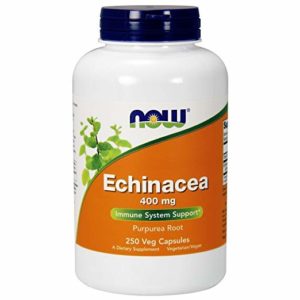Echinacea is a lifesaver in soothing all sorts of infections, cuts, and skin diseases. We’ve put together the Best Echinacea Supplements to help you decide.
Echinacea is a herb native to the prairies in North America that is used as an herbal supplement to improve your immune system, protect you from illness, and help you recover faster when you’re sick.
Native Americans used it for hundreds of years to treat various ailments, and clinical research has started to explore the science behind using it as an immune system booster
Echinacea may be the answer to your quest for a stronger immune system and better protection against the common cold.
We’ve reviewed and ranked the top 10 echinacea supplements available today.
Rankings
1. NOW Echinacea
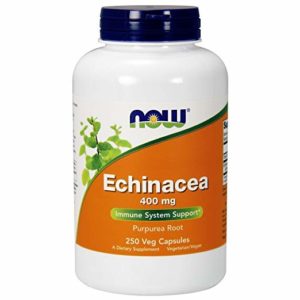
NOW EchinaCee is a simple way to boost your immune system. With 400 mg of Echinacea plant material per capsule, this is a Vegan-Friendly and Very Pure Supplement.
The only additional ingredient needed is a small amount of plant-based stearic acid to help keep the capsules together.
2. Puritan’s Pride Echinacea
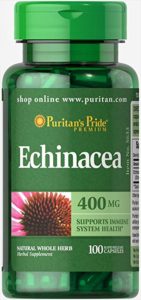
Puritan’s Pride Echinacea is a natural supplement with no fillers, additives, preservatives, or anything other besides the active ingredient. Each capsule contains 400 mg of echinacea root extract. There are no other ingredients.
Most people who don’t eat meat won’t be able to tell the difference between this product and any other gelatin.
3. Herb Pharm Echinacea Immune-Support is a natural
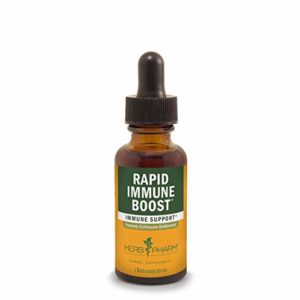
Herbalife Echinacea Immune Supplement is an organic liquid form of echinacea that has the added benefit of being certified organic
This is particularly attractive if you use a raw extract from plant materials because you don’t want pesticides or herbicides.
While measuring out drops isn’t going to give you as precise of dosage as you’d get in a capsule, it’s still a good option for those who want an easy way to get a pure echinacea tincture.
4. Vitacost Echinacea
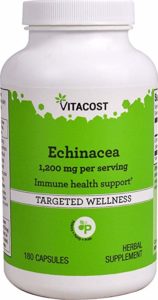
Vitacoost Echinacea is a great choice if you want a high dose of echinacea root. At 600 mg of extract per capsule, it’s head and shoulders above most others.
It’s unclear whether you actually need a dosage of this high. According to the research, not everybody needs a dosage of this high, but some people may benefit from it.
5. Echinacea is an herb that helps your immune system fight off infections.
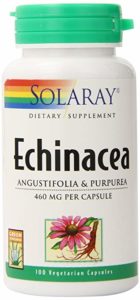
Solaray Echinacia with Vitamin C and Zink attempts to deliver echinacea alongside a range of other ingredients that boost immunity.
These include, as the name suggests: Vitamin C and Zinc, which have both been shown to be effective against infections, but also rose hip extract, bioflavonoid concentrates, and hesperidins.
It’s not clear whether these supplements offer any additional benefit over echinacea supplements alone, but they might be worth trying if regular echinacea supplements aren’t working for you.
6. Gaia Herbs Echinacea Supreme
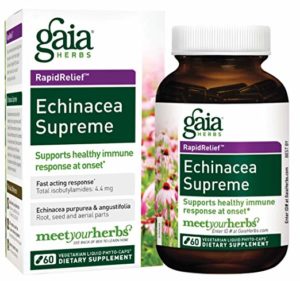
Gaia Herbs Echinacea Supreme uses a proprietary blend that includes both echinacea purpureas and echinacea angustifolia.
It’s not easy to figure out exactly how much of this product you need to take, so following the clinically proven dosing programs is going to be more difficult with this product.
7. Nature Made Echinacea
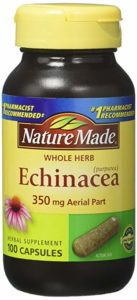
Check price at Amazon
Standardizing the content of the active ingredients is one way to ensure consistency in the product, but the main downside is that the dosage is low, at just 350 mg per capsule.
The supplement design is fine, but other echinaceas outclass this one when compared to its dosage and purity.
8. Nature’s Way Echinacea Goldenseal
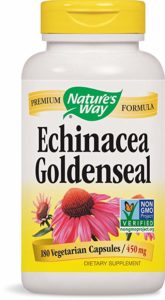
Nature’s way Echinacea Goldenseal is an herbal combination of seven different herbal compounds designed to boost your immune system.
These include echinacea, goldenseal, burdock, gentiana, cayenne pepper and wood betony.
The only problem with this strategy is that the ingredients are mixed together in an undisclosed proprietary blend, so you don’t know how much of each ingredient is included in the supplement. This makes dosing decisions difficult.
9. Amazon Brand Vitamin C with Echinaecea is a natural supplement
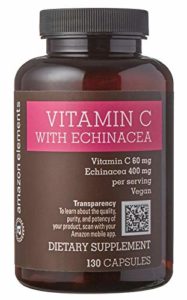
Amazon is the largest online retailer in the world. It sells everything from books to clothes to electronics. But it’s new at selling supplements. Its new product, called “Echinacea Plus,” contains 400 mg of echinacea root and 60 mg of Vitamin C. The company claims that the combination will help boost your immune system. However, the capsules are made of cellulose, which is not very effective at binding ingredients together.
It’s an okay choice if you want vitamin c alongside echinacea. However, it’s outmatched by several other supplements.
10. Best Naturals’ Echinacea & Goldeneye Root
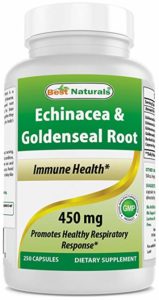
Best Naturals’ Echinacea & Goldeneye Root has the same herbal composition you’ll find in several other echinacea and goldenseal combinations, including burdock and cayenne.
However, there are many other reasons why you should avoid taking this product. First of all, the ingredients are not just hidden behind a proprietary blend; they are also poorly dosed. Most people would be far better suited by a different supplement, especially if they wanted a combined herbals formula.
Who Should Buy Echinacea?
Echinaceas are a genus of flowering plants in the sunflower family Asteraceae. There are about 30 species of Echinacea native to North America, Europe, Asia, and northern Africa. All parts of the plant are used medicinally. The root is the most commonly used part. It contains a number of compounds, including caffeic acid derivatives, flavonoids, polysaccharides.
Echinacea is an herb used for centuries to treat colds and flu. It contains compounds called polysaccharides, which help boost the immune system. However, there is evidence that echinacea may increase the risk of infection when taken during periods of high stress. Echinacea may also interact with certain prescription drugs, including those used to treat HIV/AIDS, tuberculosis, and cancer.
How We Ranked
Echinaceas are a genus of flowering plants in the sunflower family Asteraceae. There are about 30 species of Echinacea native to North America, Europe, Asia, and northern Africa. All species of Echinacea contain the same active ingredients, but the concentration varies depending on the plant. Echinacea purpureas are the most commonly available and best studied. Echinacea purpures contains the highest concentrations of the active ingredient, polysaccharides, and is considered the most potent form of Echinacea. Angustefolia is also very high in polysaccharides, but it contains less of the active ingredient than E. purpurea. Echinacea pallida is the least potent of all three types.
We also looked at the added ingredients, including vitamin C and zinc. We found that products that went the extra mile and included these ingredients alongside quality echinacea were rewarded. However, we preferred pure echinacea products, which is why Now Echinacea took first place on our list. Now capsules use a cellulose shell instead of a gelatin-like one, which allows them to absorb more nutrients.
Benefits
Echinaceas are a genus of flowering plants in the sunflower family native to North America. Echinacea purpurea is the most commonly used species of echinacea. It is also called purple coneflower, purple cone flower, purple cone flower, and purple cone plant. It is an herbaceous perennial growing to about 1 m tall. The stems are hairy and branched. Leaves are alternate, simple, oblong, 2–6 cm long, and 0.5–1 cm broad. Flowers are produced in dense clusters at the
Echinaceas are often combined with other supplements that boost immunity, like zinc and vitamin c. Is echinacea really worth adding to your supplement regimen? We’ll review the scientific evidence.
According to a study published in the Journal of Clinical Microbiology, the average adult gets about 2-3 colds per year, and children get sick even more often. There is no cure for a common cold, but many rely on echinacea to prevent or help shorten its duration.
Echinacea is an herb that has been used for centuries to treat colds and flu. There have been many clinical trials done to see if it works. Some studies show that it does help, while others show that it doesn’t.
Echinacea seems to have a positive effect on sickness frequency and in speeding up the rate of recovery. However, the effect size is not big, and these highly varied claims.
There are several reasons for the inconsistent results between studies. One reason is that some studies used different plant species, extraction techniques, and the addition of other ingredients.
A study published in 2007 showed that echinacea decreases the risk of getting sick by 58% and reduces the length of time you feel like you have a cold by 1.5 days.
Researchers found that taking placebos was more effective at preventing colds than taking echinacea.
Researchers set out to investigate whether echinacea preparations are more effective than no treatment, whether they’re more effective than placebos, and whether they’re equally effective as other treatments for preventing and treating the common cold.
A total of 3 studies compared the effectiveness of echinacea against placebo. Two studies found that echinacea did not prevent colds. One study found that echinacea reduced the duration of cold symptoms. Another study found that echinacea did not reduce the number
None of the three comparisons in these studies showed any significant effects over placebos.
When comparing an echinacea preparation with placebo as treatment for colds, a significant effect was found in nine comparisons, a non-significant trend in one, and there was no difference in six (five).
Echinaceas help to reduce duration of symptoms for adults. A 2001 randomized controlled trial showed that Echinacea helped reduce symptoms’ duration in adults with a cold.
Echinacea purpurea is an herb that has been used for centuries to treat colds and flu. A recent study showed that taking Echinacea purpurea before getting sick could shorten the duration of your symptoms. However, there were side effects associated with taking Echinacea purpurea.
Echinaceas are a type of flowering plant native to North America. They are also called purple coneflower because of their bright purple flowers. Echinacea is an herbaceous perennial plant that grows up to 1 meter tall. Its stems are hollow and its roots grow deep underground. Echinacea is often used as a medicinal plant. It is used to treat colds, flu, and other illnesses.
Studies began when patients first reported symptoms and continued until they recovered.
There were no differences in the overall estimates of the severity of upper respiratory tract infections between the two treatment groups, but the study did show that the participants who used the nasal spray reported fewer symptoms than those who used the oral drops.
There was no difference between the two groups for the number of days of fever, the number of days of peak symptom severity, or the number of days of illness.
Rash occurred during 7% of the infections treated with Echinacea and 2.5% of those treated with Placebo.
A 2005 study published in The Lancet Infectious Diseases found that echinacea had no effect on colds caused by rhinoviruses.
On the other hand a 2004 study using another Echinacea composition -purpura (2.4 mL three times per day for seven days before and 7 days after intranasally inoculation with rhinocerus virus type 39) -to evaluate its ability to prevent infection with rhinocerous virus showed promising results.
Placebo recipients developed colds at a rate of 82%, whereas that given echinacea had a rate of 58%.
Echinaceas are a genus of flowering plants in the sunflower family Asteraceae. There are about 30 species of Echinacea native to North America, Europe, Asia, and northern Africa. Many species are cultivated for medicinal purposes.
The group that took two tablets a day (20 mg) reported decreased STAXI scores within three days. These effects lasted for the duration of the 7-day treatment and for two weeks after treatment.
The lower dose (2 mg) did not affect mood significantly.
Echinacea purpurea is an herb that grows in North America and Europe. It is also called purple coneflower because its flowers are purple. It is used to treat colds and flu. Essential oils from extracts of E. purpurea have anti-inflammatory properties. The anti-inflammatory effect was evaluated in vivo by different animal models with three serially dosages used: low
All three doses of extract produced significant inhibition of ear edema induced by Xylene when compared with the control group.
Only the high dosage of the extract showed statistically significant inhibition (50%) of paw edema compared to the control group. Moreover, the granulation model was also significantly reduced (29%) by the highest dose of the extract compared to the control group.
Side effects
Echinacea is an herb used for centuries to treat colds and flu. It contains compounds called polysaccharides, which help stimulate the immune system. Echinacea also contains alkamides, which are believed to have anti-inflammatory properties. However, there is not enough evidence to prove that echinacea prevents or treats colds and flu.
Side effects may include headaches, dizziness, nausea and mild stomach pain.
Echinacea has been associated with several adverse events, including severe liver damage, thrombotic thombocytopenia purpura, and leukopenia.
Recommended dosage
The correct dosage depends on the species being used as well as its form: liquid or capsules
Echinacea purpura in dehydrated powder (in capsule form) is taken in daily doses of 300 mg three times a day as well as 600 mg three times a day.
Ethanol extracts from leaves and stems are used for the treatment of eczema.
As a veteran fitness technology innovator and the founder of GearUpToFit.com, Alex Papaioannou stands at the intersection of health science and artificial intelligence. With over a decade of specialized experience in digital wellness solutions, he’s transforming how people approach their fitness journey through data-driven methodologies.
